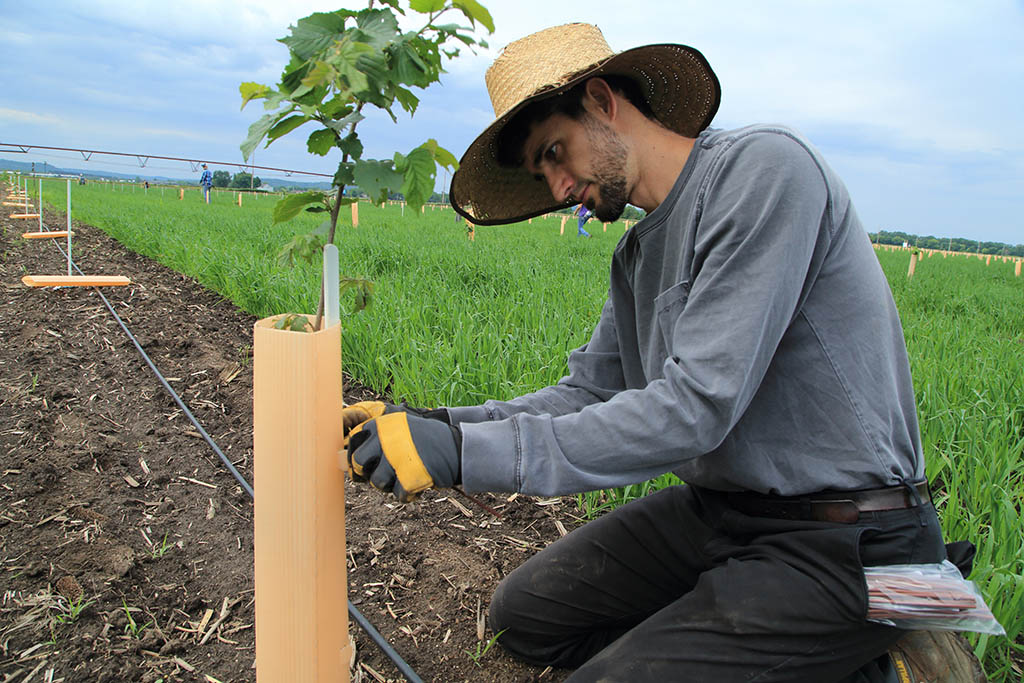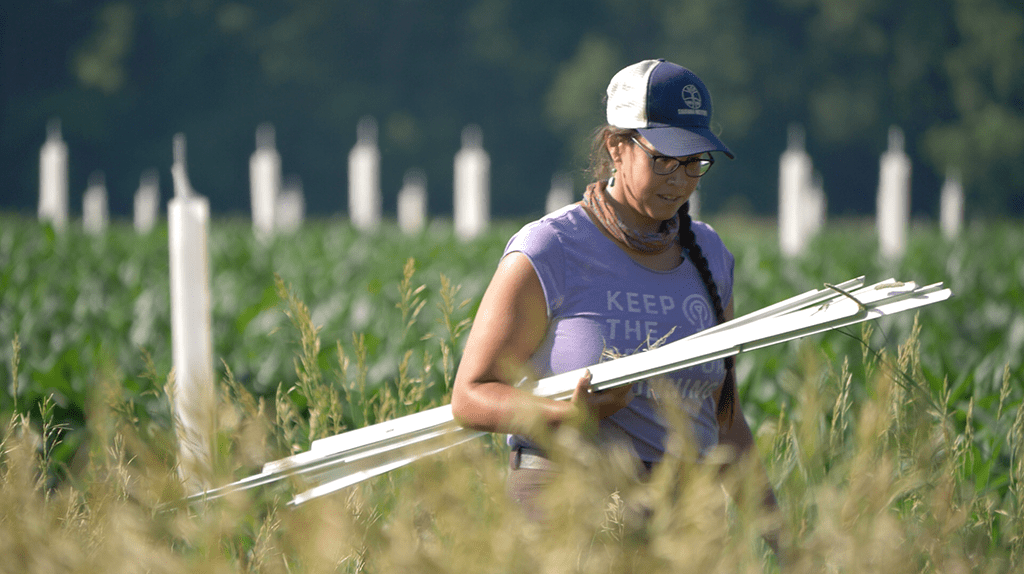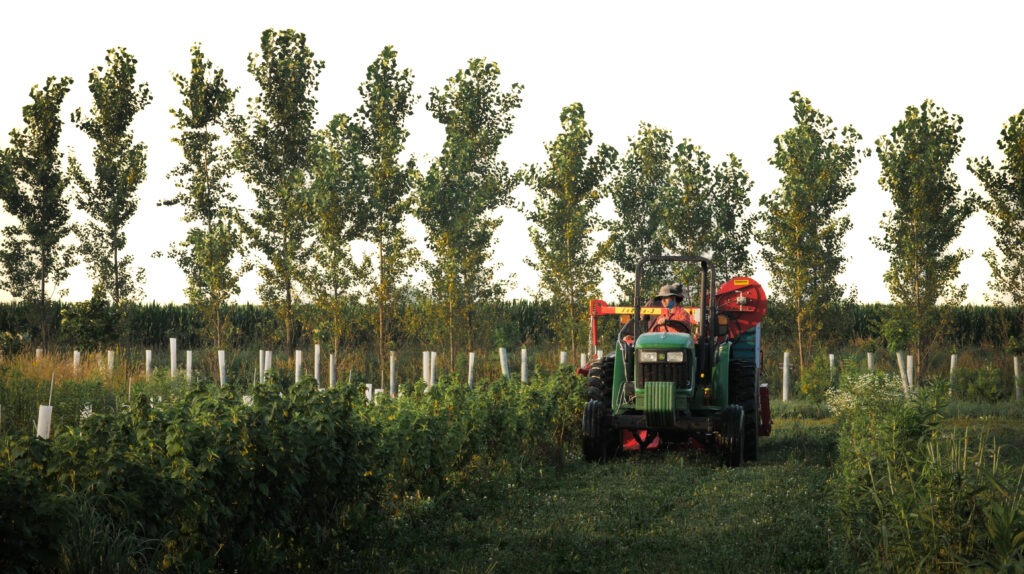Starting out in Illinois
The Savanna Institute grew out of a grassroots gathering of Midwestern farmers, graduate students, and community members interested in ecological agriculture. Together around a kitchen table on a farm in central Illinois, the volunteer group started building a network and a nonprofit organization to support perennial farmers in the region. The farmer-led group recognized the benefits of integrating trees and shrubs into diverse agricultural systems, and set out to make tree crops more available, profitable, and viable to grow in the region.


Demonstrating agroforestry
Our Mission


Our Vision
Our Values
Humility
Dignity
All beings have inherent worth.
Multiple Ways of Knowing
Expertise comes in many forms. We integrate traditional ecological knowledge, observation, and scientific inquiry and welcome multiple worldviews.
Public Benefit
We have a responsibility to work together with partners towards a more diverse and resilient ecology, economy, and society for the benefit of the public good.
Interdependence
Ecology
All life is interdependent and relies on a diverse and resilient ecology to thrive.
Diversity
Cultural diversity and biodiversity are inherently linked. Our vision for more ecological agriculture will bear fruit when a diversity of perspectives and voices are included.
Equity
Historical injustices and continued discrimination inhibit our vision from taking root. We promote equitable access to programs and resources within food and farming systems.
Our History
2013
The Savanna Institute was founded by a small group of volunteer board members in Illinois.
Launched our first program, the “Bulk Plant Program,” which offered farmers custom orders of tree crop planting stock from select nurseries.
2014
Keefe Keeley joined the Savanna Institute as Executive Director.
Launched the Case Study Program with seven farms across three states, creating a participatory knowledge network for tree crop plantings.
2015
Received our first grant to study “Crop Performance, Pests, and Pollinators in Diverse Agroforestry Systems.”
Held our first official farmer gathering, which became known as the Perennial Farm Gathering, a one-of-a-kind community learning and networking event for perennial farming enthusiasts that we’ve hosted every year since.
2016
Published, with Farm Commons, Inspirations for Creating a Long-Term Agricultural Lease for Agroforestry: A Workbook by drawing on our case studies of farmers who secured long-term access to farmland for agroforestry enterprises.
Held our first workshops, on silvopasture and perennial crop management.
2017
Kevin Wolz transitioned from his role as founding President of the Board of the Directors to become Co-Executive Director.
Published Perennial Pathways: Planting Tree Crops, a foundational handbook for farmers adopting agroforestry, with lead author Matt Wilson.
2018
Launched our first video series profiling six established Midwestern agroforestry farms. Premiered Persistence: Midwest Farmers and their Uncommon Crops, a mini-documentary by filmmaker Anders Gurda produced by the Savanna Institute and partners.
2019
Launched our Apprenticeship Program, which provides on-farm learning and mentorship opportunities with experienced agroforestry farmers.
Established first alley cropping demonstration at Silverwood Agricultural Park, part of the Dane County, WI public park system.
Published the Hazelnut and Chestnut Impact Investment Plans to identify bottlenecks and opportunities for the marketplace
2020
Became the steward of the first of our four farms that make up the Spring Green Campus in Wisconsin’s Driftless Region.
Partnered with the University of Illinois and Lourash Farms to establish an alley cropping demonstration at 4-H Memorial Camp in Allerton Park near Monticello, IL.
Partnered with Scott and Sandy Williams and their farmers The Rodgers Family to establish Fields Restored Demonstration Farm, which features a multi-functional riparian buffer and silvopasture experiment.
2021
Added two more farms to the Spring Green Campus, each demonstrating agroforestry in a different context and scale, and offering settings for long-term research and intensive farmer training.
Launched our Technical Service Program to provide one-on-one farm planning support to landowners, and our Water Quality Program to focus outreach to landowners in key watersheds.
Launched our Breeding and Commercialization Programs to improve tree crops and their markets.
2022
Spun off Canopy, a perennial farm management business and tree crop nursery serving Wisconsin and Illinois. Kevin Wolz stepped away from his role as Savanna Institute Co-Executive Director to lead Canopy as its CEO.
Established Hudson Demonstration Farm with support from NRCS in a long-term partnership with Savanna Institute-supporter Cathe Capel, which features a 20-acre windbreak and 100 acres of annual and perennial alley cropping.
Received USDA Partnerships for Climate-Smart Commodities grant with partners The Nature Conservancy, Organic Valley, and more.



